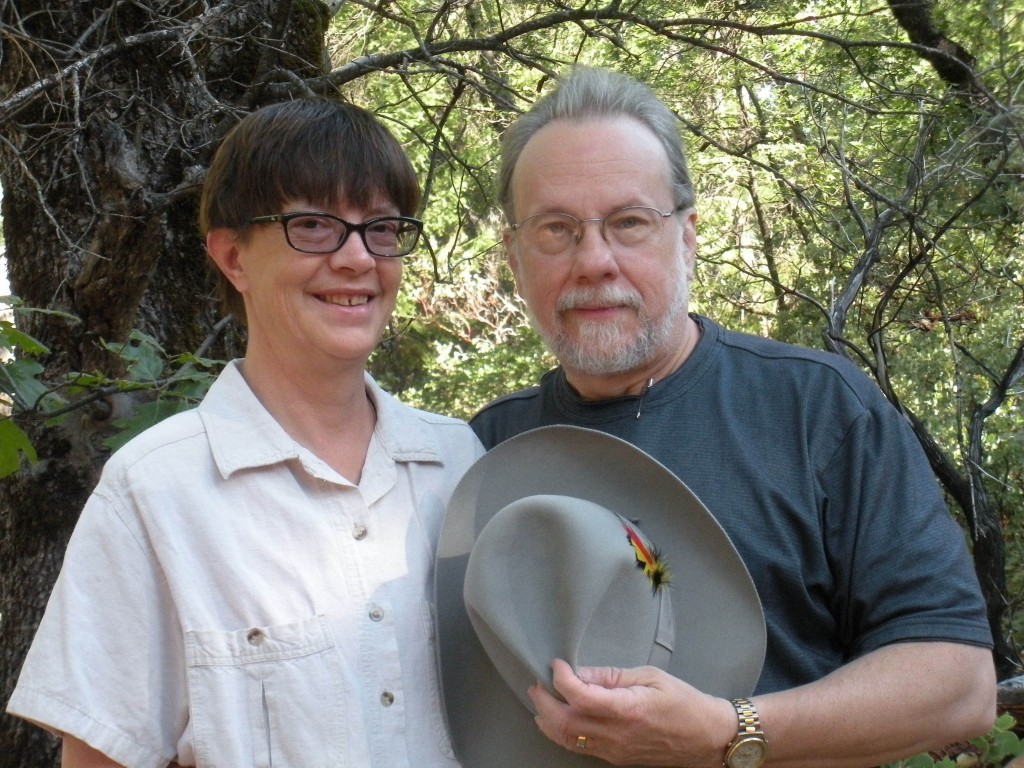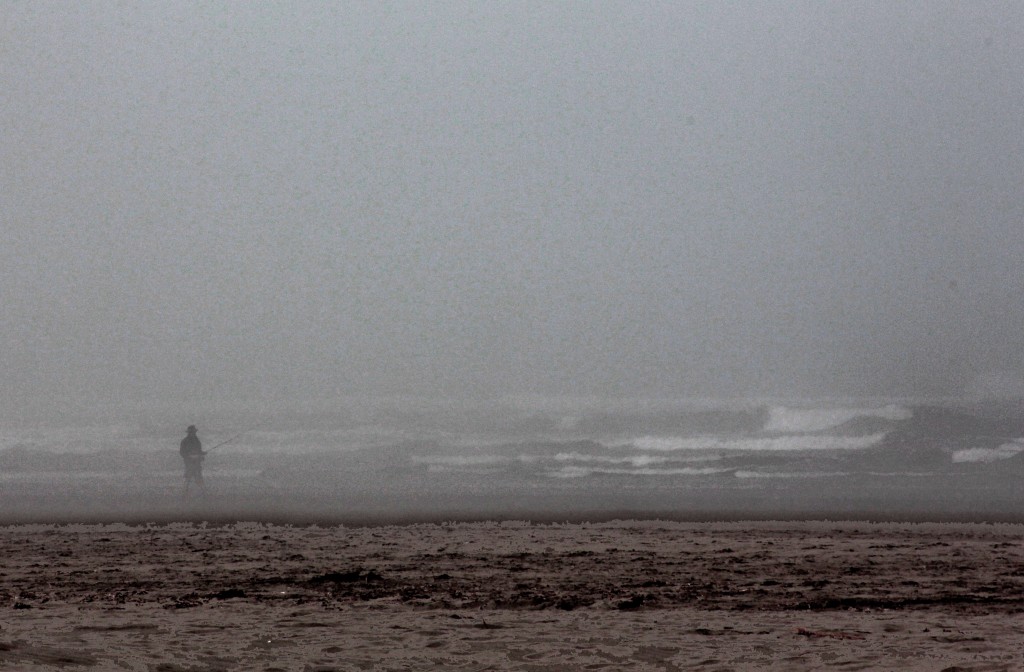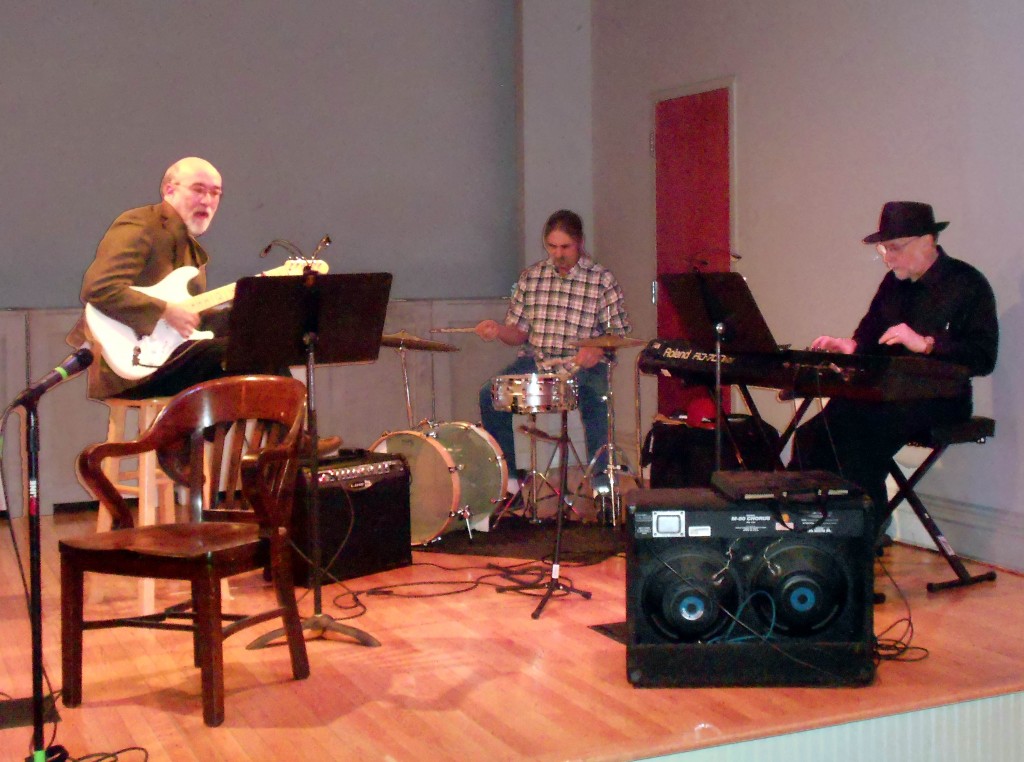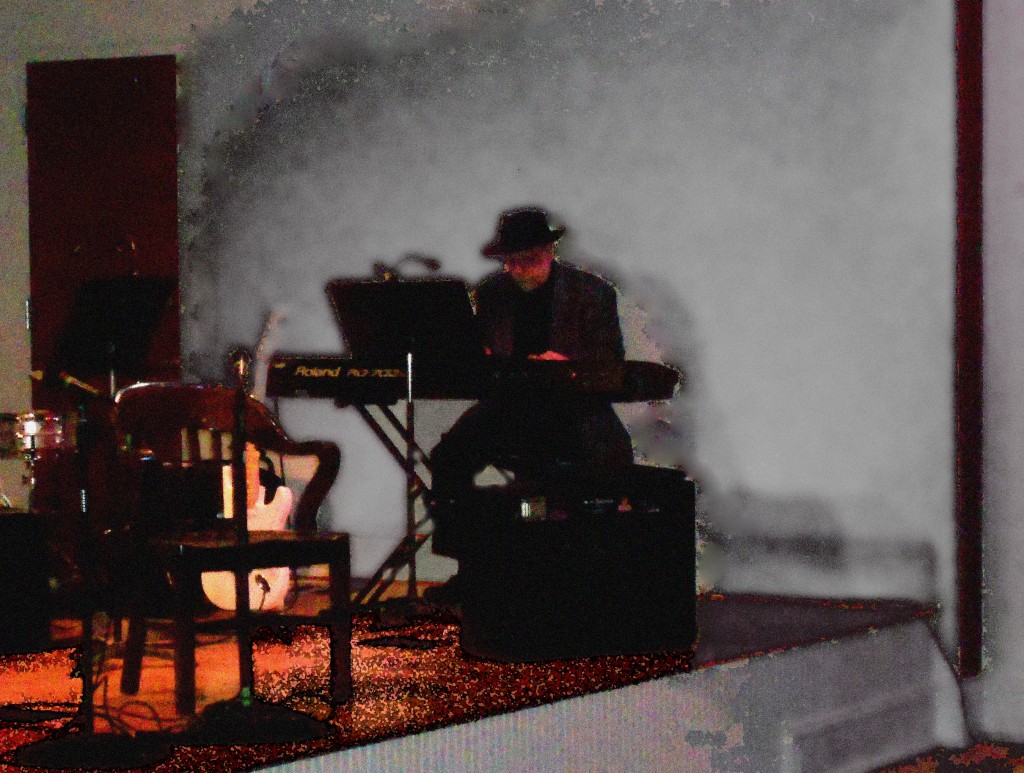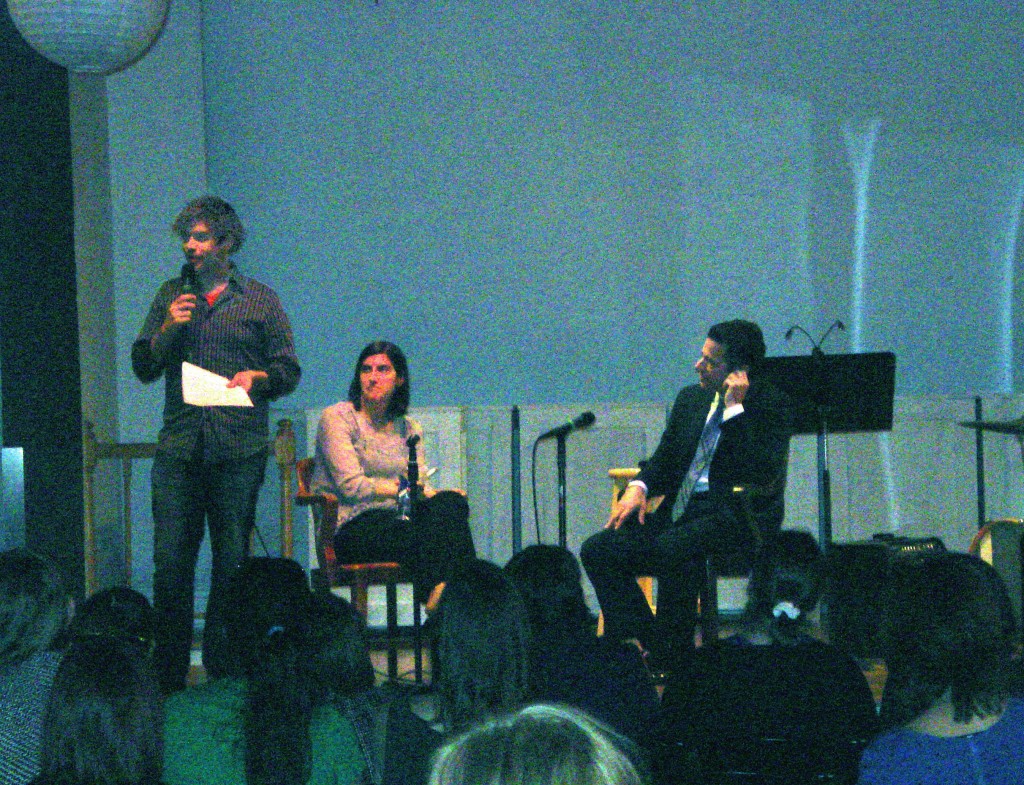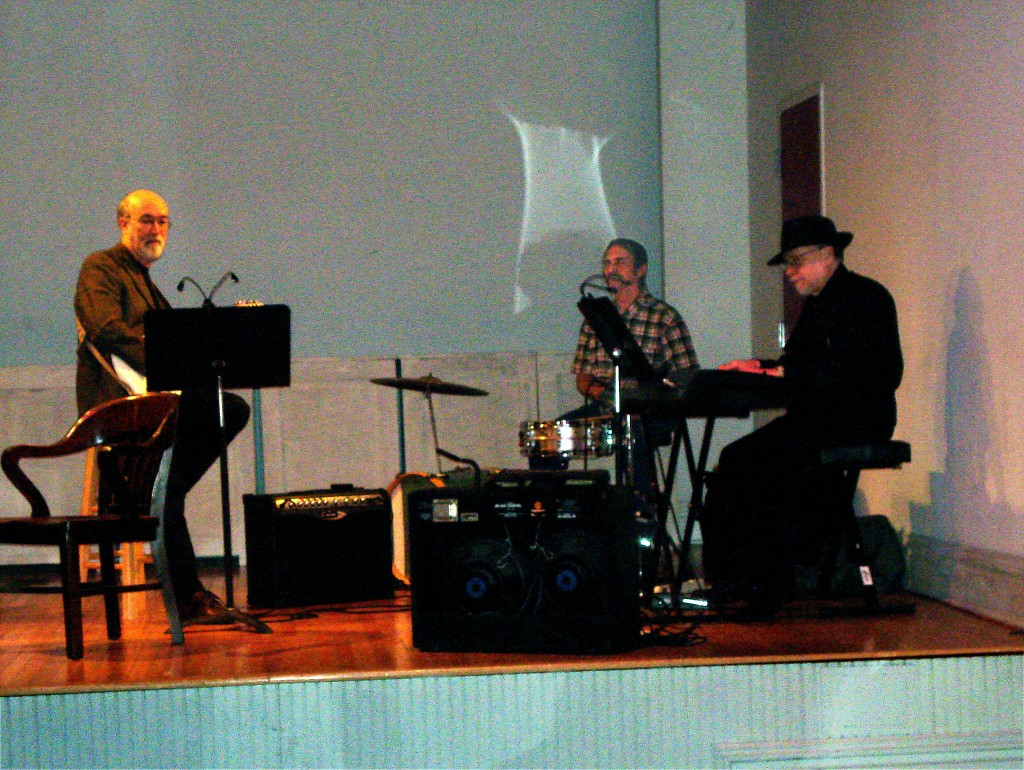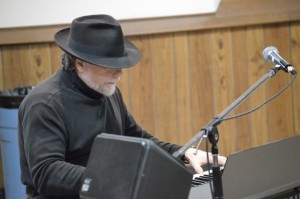A new portrait, done by Nan Kaufman, who, with her husband Peter Fuss, hosted us for a marvelous weekend of rustic peace and quiet—plus driving all over the place between Alta and Placerville.
Category: Personal
On The Road…And Back
- Posted on
- – 2 Comments on On The Road…And Back
Few things satisfy me more than going on a trip with Donna. In the last three decades we’ve taken some fine vacations and she is the best traveling companion I’ve found.
This one, however, contained extra pleasure.
On the Fourth of July we flew to Sacramento, CA, to attend Westercon 66. I’d forgotten (if I ever really knew) that Westercon in years past had been a Big Deal. Major regional SF convention. It had fallen into decline, though, and this one was the first in an intended recovery. I hope they manage it because this one was truly fine. Even if it hadn’t been, though, it would have been great because two of our best friends, Nicola Griffith and Kelley Eskridge, were co guests of honor. We’ve known each other since Clarion in 1988.
But wait! There’s more! As well, Brooks Caruthers, Jay Brazier, Kimberly Rufer-Bach, and Andy Tisbert joined us for a mini-class reunion. One of our instructors, Kim Stanley Robinson, also showed up for a day, as did the current director of the workshop, Karen Joy Fowler. Another Clarionite, Cliff Winig, class of ’97, attended as well.
I’ll write more about this later. For now I just wanted to put a place marker down to note that the feelings felt and expressed were unexpectedly strong. Donna commented that watching us it seemed our Clarion group had parted company only last month, so fast did the reconnection happen. I’d forgotten the way in which these people mean so much to me.
After the convention, however, we leased a car and headed into the Northern California hinterlands to finish up some of what we’d missed back in 2001 when we drove from Oakland to Placerville to Eugene to Seattle. The balance of the trip was as amazing as the beginning, in wholly different ways. I shot over 500 photographs. Over the next several weeks I’ll post those I deem worthwhile and tell you all a little bit about the trip.
Basically, we headed for the coast. The first leg ended at Eureka. We went up the coast to Crescent City, then up 199 and down the other side of the range to Redding. We ended in Alta, for a quiet weekend with two friends who have made themselves a pocket of peacefulness atop 4000 feet of foothill. As with all the best trips, it ended too soon.
Meanwhile, I’ll leave you with another image and the promise of more details and other photographs. We’re back home now, chock full of memories, and glad of each other in new ways.
It Was Many Years Ago…
Twenty-five years ago I arrived on the campus of Michigan State University to begin the six weeks of the Clarion Science Fiction Writers Workshop. Donna had driven me up, along with a friend (because I didn’t want her driving back alone—which led to a small bit of confusion because while Donna was catching a nap in my dorm room, everyone else met Drea and then when Donna picked me up, there was some, as I say, confusion…) and then left me there for six weeks of the best pressure cooker experience I’d ever had. I’ve written about it here and here.
That was a defining time for me. It told me that I could be a writer and gave me the tools to do it.
That was a quarter century ago and soon we’re traveling to the west coast for a reunion of sorts with a handful of fellow classmates. Some of us have done quite well. Others…well, me, for instance…
This month marks the tenth anniversary of the release of the final Secantis Sequence novel to see publication. June of 2003, Peace & Memory came out from Meisha Merlin.

Book Three of the Secantis Sequence, which began with Compass Reach, continued with Metal of Night, and ended—for now—with this one.
Of the three, it has my favorite cover, which is a tale in itself, done by the estimable O.B. Solinsky. It captures a scene in the novel and evokes one of the themes as well. I enjoyed the entire process of working with him on this and the result still makes me smile.
But as I say, that’s the last one published. Due the vagaries and vicissitudes of the publishing industry, my “career” more or less collapsed after that. Meisha Merlin no longer exists.
I’ve been trying to get back into the game pretty much ever since.
I did publish two more novels after this one, one a sharecropper novel that pretty much sank without a trace and Remains, which is by some miracle, still in print. I’ve provided links for both novels.
Since 2003, I’ve been scrambling. Mistakes were made. I’ve been through a couple of agents. (I am now with one of the best I’ve ever had, Jen Udden of the Donald Maass Literary Agency, and we shall do great things together.) I’ve continued to write. It’s easy to succumb to despair in this business. It is so hard to get into print, harder still to stay in print, and the work can suffer from the difficulties of finances and the doubt that plagues any artist.
But as I told another artist recently, I’ve given up giving up. I don’t know how many times I’ve quit only to wake up one morning with a great idea, and suddenly I’m hip deep in a new project. (This one will work, this one will do it…)
I said Peace & Memory was the last Secantis novel published. It’s not the last one. I have a fourth one completed, Ghost Transit, and notes on another, Motion & Silence. The sequence was always intended to continue.
So it’s been ten years. I have every intention of not going away, of seeing the Secantis Sequence back in print and continued. With that in mind, I have an experiment I’d like to run. I understand the utility of the whole Kick Starter thing, but funding a project is not quite the same thing as creating a demand. Demand is created by people talking, people asking, people wanting. Maybe letting publishers know that something is Out Here that’s not available in print. Not sure. I’ll leave methodology up to the groupmind.
Meantime, in celebration of ten years, order copies if you’ve a mind. I have a preferred venue, of course, Left Bank Books—you can get the three Secantis books through them, at least until supplies last. (And lots of other really good books—you can order online from them, so please do, support local bookstores.)
Ten years. And twenty-five. Time flies when you’re working hard on something you love.
Clarion is no longer on the MSU campus, but all the way across the country in San Diego (link above). I, however, am still in St. Louis. Still writing. I suspect I will be for some time.
Thank you for your support.
Colloquial For “Why, I Didn’t Mean Nothin’ By It!”
I confess when everyone started talking about Paula Deen this past week, I had a moment or two of complete cultural disconnect.
Who?
Oh, she writes cookbooks and does a show on Food Network. Hm. So what?
I’m still not altogether sure what she did, what trial she spoke at where she rather obliviously let it be known that she thinks using the N-word is just fine. I’m not really interested enough in her—or any other cooking personality—to give much of a damn. I don’t read cookbooks (I have several, I couldn’t tell you who wrote them) and I don’t watch Food Network (we don’t have cable or dish), so this is a part of the popular zeitgeist of which I am rather oblivious.
But I do work in a bookstore now and Paula Deen has a new book coming out. I just learned that we won’t be handling it.
Here‘s a good piece on this particular aspect and a good write-up on the controversy.
Reading some of the reportage on this has put me in mind to recall all the casual bigots I’ve known over the years. In some ways they’re worse than the very up front bigots. With them you know where they stand. They pretend nothing. Take them or leave them and here’s why. No betrayed expectations.
Casual bigots—the ones who blithely reveal themselves in offhand comments and thoughtless characterizations the problems with which they clearly seem utterly unaware—sucker you in. You start to like them or you do like them. You might even find yourself building some kind of relationship with them, which suddenly, at the drop of an epithet, you’re forced to revisit.
It’s worse when you work for them. Your options become severely limited.
I worked for one such for almost nine years. He was a gregarious, congenial man with the intellectual depth of a Dick and Jane reader. Quick with a joke, always ready to see the funny side to anything, a natural-born salesman.
Who never understood why propositioning female customers or remarking that certain folks were okay because really they were white people in black skin wasn’t just, well, fine.
Whenever one of his little racist aphorisms popped out, something primal in my backbrain stirred and I wanted a bar of soap or a leather strop. He “meant nothing” by them. So why say it? I’d ask. Why is that guy (who’s white) an asshole and that guy (who’s not white) some variation of n—-r? Why can’t they both be assholes, if that’s what you mean?
And he for the life of him couldn’t get past the surface detail that the one was white and the other black. “So a black asshole is fundamentally different than a white one?”
Eyes would glaze over. Well, obviously, because, well, he’s black. Not white.
We went round and round with this for years. I continued to work there because I’d been working there before he bought the business and I loved the place. I was committed to it on several levels. He sorely challenged my devotion.
But I also thought—hubristically, perhaps—that I could turn him around. I really believed in the power of education, that if I explained it, showed him, that at some point the revelation would occur and…
The problem is, many people, possibly most, live by categories. They have separate compartments into which the different strategies and judgments they must make to get through a day are stored and rather than think it through each time, they just select among the bins. At a certain level, this is probably necessary—we all have to function on autopilot at times, else we’d overload our consciousness with decision-tree minutiae that would make coming to any decision impossible. Daniel Kahneman wrote an excellent book about this, Thinking, Fast and Slow.
But the walls of the compartments are often porous and the arrangement changes over time with new information and understanding.
For the casual bigot, though, particular compartments are very deep and filled with too much crap to be easily discarded, and the particular pathway to those compartments is a well-established trail—rut, really—and getting rid of it would require a major trauma. (I suspect in some ways dealing with an up front bigot might be easier because the walls are even less porous and it might be possible isolate that compartment and sever the connection completely—but I’m guessing there.)
It’s like the casual sexist who just can’t see what harm there is in thinking the way he—or she—thinks. After all, they don’t mean any harm, and honey, if you’re gonna be one of them feminazis, why then you’re just lookin’ for somethin’ to be offended by.
Gradually, I began to notice another aspect of his personality. I’m theorizing here, but the behavior was such that it seems a reasonable conclusion.
Losing a prejudice is directly proportional to knowing people. How well and how deeply translates to a subsequent inability to discriminate.
I don’t think he really “knew” anyone. Everything was on the surface. He went only so far even with people he genuinely liked.
Not, I think, because he couldn’t. But he’d never had to. He couldn’t make the leap to stop designating people by surface details and secondary characteristics because he treated everyone as a collection of surface details and secondary characteristics.
When he finally noticed that we’d lost many of our female customers (especially the younger, “attractive” ones), he seemed genuinely confused and I don’t think he ever recognized that his casual intimacies with them—uninvited—had driven them away. “But they laugh,” he said when I explained to him once how what he’d been saying as his then-current joke was basically sexual harrassment. They laugh, which to him meant acceptance. (Of course, when one of our customers complained to me about it and I told her next time to shut him down, well, the moment she did she went from someone he liked to a Bitch.) He never looked past that laugh to see the shock and nervousness. It was all surface.
So when someone so entrenched in certain cultural “norms”—like a Paula Deen—makes news for the apparently “innocent” remarks that have been okay in her group and among her “friends” for years, I recall that nine years of education I received in the company of someone who just never Got It. And I wonder, how well does this person know anyone? After all, Paula Deen has handlers, she has advisers, she has people whose job it is to make her aware…and if they can’t get through and break down those compartments, then I have to wonder. Obviously, it caught everyone off-guard, so it’s not like she’s an up front bigot.
I tried to explain a false syllogism once to my boss and after three sentences I glimpsed a brief manifestation of despair—he sensed, I imagine, that this was a concept that would require him to reassess…everything.
And he just wasn’t able to do that.
As for the “Why, I don’t mean nothin’ by it,” defense…well, then why did you say it in the first place? Are you always that feckless and shallow? Is there anything you say that you do mean something by?
And if not, then why are you so confused that no one will take you seriously when you apologize?
On The Extraction of Feet From Mouths
I’ve been thinking deeply about the recent eruption of controversy in SFWA over sexism. Seems just about anywhere we look in the last several years there are examples of men behaving stupidly toward and about women. While this is nothing new, where it has been cropping up seems surprising.
There have been several incidents, both online and out in the world, within the skeptical community. The boys came out to try to tell the girls to get their own clubhouse and stop invading what for some reason these males had regarded as somehow the province of people with testicles. Prominent women—skeptics, humanists, atheists, scientists—have been treated to high school-level chauvinism by males intent on…
On what?
It’s worth reading this article by Rebecca Watson, one of the most prominent women in the active skeptical world. Some of what she has gone through seems totally bizarre, of the “what planet did this happen on” variety. And yet, there it is. The Thing We (people like me) Had Thought We Were Done With. Males acting like schoolyard bullies toward women, especially women who claim themselves as individuals with minds, choices, and, apparently, interests that don’t include them. The boys, that is.
Reading that, someone like me can feel pretty virtuous. “I don’t think that way! I don’t do that! The people I hang with don’t, either, we’ve outgrown adolescence and never were that gauche!” We might feel that way and some of us might even be justified.
But not all of us.
I’ve been a science fiction reader practically all my life. I’ve been a professional SF writer since 1990, therefore a member of SFWA. I have credited science fiction, my early exposure to it, as reason for my awareness of gender issues, my embrace of feminisim, and certainly my affiliation with skepticism, rationality, and—may I say it?—humanist morality. The circles in which I move resonate with all this as well and over decades a kind of blanket of comforting isolation has settled around me that has buffered me from some of the kinds of bullshit that has evidently been there all along.
There’ve been several instances of sexism over the last few years within the science fiction community, some at an apparently low-level, others fairly significant, culminating in the current Matter At Hand over a series of articles in the SFWA Bulletin (as well as a cover painting for one issue) and the responses prompted concerning them.
Disclaimer: I tend to ignore the Bulletin anymore. A lot of the information contained therein is wonderful for beginning writers or those just starting up the ladder of their careers. Occasionally there’s something technical in an issue worth reading. But really, it comes because I pay my dues and I go through the Market Report. Therefore, I had to go find the issues at the center of the storm, dig them out of the pile, and read the pieces in question.
Which means that I absorbed them somewhat in isolation.
Nevertheless, to my complete embarrassment and shame, I misread what was supposed to be the problem. Then I compounded that failure by defending them.
Not full-faced “what the hell is wrong with you people” defend, just…
The offending articles were two in the long-running series of dialogues by Mike Resnick and Barry Malzberg about the history of the genre. These are, for those of you who do not get the Bulletin and don’t know, done as conversations, two guys who’ve been around for a long time, yacking about the Old Days and who wrote what, published where, said that, or did this. They are framed as personal reminiscence.
Which to my mind is a somewhat different context than a straightforward article about, say, copyright law or manuscript formatting or how to write a cover letter. It’s a different kind of work and therefore has different parameters. Like memoir, what the author (or authors) get to talk about and how they talk about it gets more leeway. Constraints are not as tight, subject and content are more flexible. To my mind.
So therefore when I read a couple of paragraphs in one of these about a particular editor who was evidently “drop dead gorgeous” and “looked great in a bikini” I thought nothing, or at least very little, of it. It’s not the same as if it had been a straight up piece about how to submit a story to said editor and had included the aside, “and by the way, when submitting to her, keep in mind she’s a babe!” Had such a sentence been in such an article, my hair would have stood on end and electric cascades would have run up and down my spine. What the hell does that have to do with the professional relationship detailed in the article? And it’s true, that if the article had been talking about a male editor, you would likely never see an equivalent remark “And by the way, when submitting to this guy, remember he has a hell of a package!”
Had you read such a remark, we should all know (if it needs explaining, as it apparently does) that the difference is that in the case of the man it is an irrelevancy but for the woman it is a threat.
More clarity? While a man might view his “package” as an essential aspect of his identity, society at large does not. The same cannot be said about a woman and her physical attributes. Therefore, the inclusion of such a comment about a woman is automatically limiting and de facto sexist. Because the writer has decided that this is the important fact about this woman and while he (or she) may not intend it to be limiting, there is a whole file cabinet of associated conclusions attached to such a description that gets opened once the statement is made.
Is this a bad thing, you ask?
Well. As has been pointed out by some over this, good or bad, it is problematic. Because the message has connotative force in the negative. Because, unfortunately, for too many people, “looks great in a bikini” is the beginning and end of any worthwhile description. All else becomes secondary. Tertiary. Immaterial. Distracting.
Welcome to Gor.
My mistake was in not recognizing this essential fact. That intent doesn’t matter when there is ample information that such a phrase will be taken as a threat by a great many people.*
Resnick and Malzberg also consistently qualified who they were talking about. “Lady writers” and “lady editors.” Again, my context filters were on. I thought, that’s who these guys are, they’re from a generation that would consider that a polite cognomen, what’s the big deal? Forgetting, as I read, how qualifiers play into limiting people not of the majority culture in, say, ethnicity. The main subject of the two articles was “Women In Science Fiction”—why the continued use of a label which served only to underscore a “specialness” that is not necessarily positive in the context of professional circles? While the substance of what they had to say was overwhelmingly laudatory (Alice Sheldon was held up to be as good as Alfred Bester and at no point did a phrase like “well, she was really good for a woman” appear) that continual qualifier became a kind of apology. In the context of a reminiscence, it was indicative of the character of the two authors—quaint, a “cute” term—but outside that context, it is like continually using the term “black writer” in a piece about African American Writers. We already know the people being discussed are black, the only reason to continually use the qualifier is to make a point of difference. Do it enough, the difference becomes the only relevant factor.
I missed all this and shrugged it off.
The other article was, in fact, a How To piece, in which Barbie was held forth as a model for professional behavior. Now, I can see how the author thought this was tongue-in-cheek, a clever, satirical way to make a point, but…
The only excuse for this is carelessness.
Well, maybe not the only excuse. Intentional, programmatic sexism is certainly possible.
Barbie cannot be a model for any kind of self-aware, in control, self-directed person. Other People have always determined, right down to the color of plastic used, what Barbie is, will be, or can be, and this point should have been obvious. The use of a toy in a prescriptive article, aimed at women, can only be…well, problematic.
Two things here. The first is, I’m disappointed. Science fiction has been for me a font of enlightenment. I don’t mean by that “everything I know about living I got from science fiction.” What I mean is, that many of the foundational ideas I consider important in my life first came to me from science fiction. I had to flesh them out later, from other sources, but something as basic as gender equality first penetrated my adolescent brain from reading science fiction. So for this to have occurred in the field which gave me my earliest intellectual nurture is profoundly distressing. It’s almost like hearing someway say “Oh, I just say all that shit in my novels, I don’t actually believe any of it!”
And, no, I am not saying that Resnick and Malzberg are themselves chauvinists. I suspect they’re shocked and dismayed both by the reaction to what they wrote and hurt by the suggestion that they are sexists. But they dropped the ball in understanding the context in which they wrote. (They compounded it by crying fowl and bleating about censorship. No one called for censorship. If anything, a call was made for more awareness.)
The president of SFWA made a statement about all this which I think is worth reading. Furthermore, the editor of the Bulletin has stepped down.
I said two things. I put my foot in my mouth over this because I also failed to see how things have evolved and how they have played out in the last 40 years. I imagined that we might reach a time when men and women might be able to recognize and appreciate each others’ sexuality without such recognition in any way acting as threat or limitation. Because a woman is beautiful (or a man handsome) does not mean she is obligated to be that for the fantasy edification of people she doesn’t know or should be constrained by that fact because others can’t see past the surface. For many people, physicality is destiny. Or fate. And often, when people in possession of certain physical traits act in ways that don’t fit those fantasy preconceptions, there is a kind of breaking that occurs which is profoundly tragic in that such preconceptions should never have been put in place to begin with. Limitation goes both ways. If all you can see is the great bod, the perfect smile, and the lush hair, I feel sorry for you—you’re missing a whole world.
Men don’t see this as a problem, though, and that’s why it’s such a big deal. Men have never been barred from being anything else they want to be by their looks. At least, not as far as the larger culture is concerned. A man is good looking, well, that’s just one more thing in the plus column, lucky bastard!
Women have different experiences with that.
Many men will still not get it. (No doubt a lot of women, too, though for different reasons.) What they will see is another demand that we stop enjoying women. That we must ignore their physicality, their sexuality. That we must turn our libidos off. They will see this as another call that we stop being “men.” That’s not it at all.
Treat women as People first. Not female People. People. It seems so simple, that. And yet…
Part of the problem in all this is the lack of grasp exhibited by otherwise bright people. You have to ask yourself, what makes you think that the kind of stuff you’re likely to hear in a bar made suitable copy for a professional journal? When you insert a sexualized comment in an article about professional people in a given field, you really aren’t talking about them, you’re talking about yourself.
Anyway, I still have a couple of toes to extract, so I’m done talking for now.
One last thing: You’re never too old to screw up, but you’re also never too old to learn from it.
_________________________________________________
* Threat? What threat? I hear some think. The threat that nothing one does matters if one doesn’t fuck. That no matter what accomplishments a woman may have, if she’s not also someone interested in, willing, and able to get sweaty with a male who thinks it’s his right and her privilege, then she’s not worth considering. That any female who seems to think she can be her own Self without this aspect is delusional and that self-selected male has not only the right but the obligation to “show her what she’s missing.” Basically, we’re talking about rape, implied and actualized, because what matters is the sex. To be sure, something of this attaches to men as well, but without the element of coercion, which renders it wholly different. Consider for a moment the most basic difference in attitude regarding “conquests.” Men who seem to have sex with numerous women acquire, with a few exceptions, a patina of glamor, respect, and envy, while women who engage in a similar lifestyle receive a very different designation and concomitant image and with few exceptions is generally negative. Furthermore, for men, it is simply one more aspect of their overall image, but for women it almost wholly subsumes anything else about them. If the boys want the women to stop pointing out their sexism, this will have to change, and the fact that it’s still the case means we have yet to achieve the kind of gender equity men like me thought we were on our way to achieving.
Bread and Sacred Cows
- Posted on
- – 1 Comment on Bread and Sacred Cows
Anyone who knows me knows I am in general antipathetic toward sports. I don’t watch it, I don’t follow it, and I could not care less who is winning or losing. The sun does not rise and set on finals, March Madness, seasons, MVPs, or any of that. I missed being infected with this particular virus as a child and have never regretted it, as I find the whole thing baffling.
Mind you, I don’t have anything at all against playing sports. I think more kids should (if they’re allowed in by the jocks, that is). But watching?
Regardless my feelings about sports as such, my biggest complaint is with the fetishizing of it and the profound cost of such obsession on just about everything. So much else of considerably more value often goes begging just so a city can have a brand new stadium. Sports, frankly, generates enough income just by being, it does not need tax payer support, and that we grant it any, never mind as much as we do, should be the subject of government hearings.
But what really gets me hot is how much education is distorted by this obsession.
Did you know that, in all likelihood, your state’s highest paid public employee is a coach?
Here’s a delightful article with a colorful chart showing this fact state by state.
Mostly football coaches.
I’m sorry, but—what the fuck is wrong with everybody? With all that we have slipped behind so many other countries in so many academic areas, exactly how does paying the football coach the highest compensation of any other public employee in a state serve to correct the profound epidemic of DUMB that seems the chief problem facing us today?
The article reiterates the well-established fact that major athletics programs make universities no money. They cost.
We’re seeing tenure under assault, staffs being cut, tuition rising across the board, and money being spent on something that does nothing to advance the state of learning. And football? A moment aside for a personal note of invective. Traumatic brain injuries, not to mention life-long injuries in general, should place this sport in the same category with boxing. The group-think, team-spirit lunacy embraced—not by the players but by the fans—would not be a problem if it did not come at the expense of so much else.
(It doesn’t help my attitude that I was once threatened by several members of my high school’s varsity team with being thrown bodily from a third floor window because I expressed the opinion in the school paper that just maybe some other things were perhaps more important than football.)
With all the complaining about wasteful spending we have to listen to from people hell bent on curtailing just about anything useful in education (not to mention the country in general) why do we not hear congress up in arms about this?
Let me be emphatic—when a coach makes more money than a dean of an entire university, something if very, very wrong. Spin it any way you like, I surely do not want to pay for this kind of crap.
Two More Tomorrow
The Men of Tomorrow
So, the other night, the 22nd to be exact, I committed Public Performance. I had help. Two brave musicians, both of whom are better at their respective instruments than I am at mine, joined me to play jazz-like music at the Mad Art Gallery where Left Bank Books and other St. Louis Independent bookstores celebrated World Book Night. I mentioned this in a previous post.
The main event of the evening was an on-stage interview conducted by author Curtis Sittenfeld of author J.R. Moehringer.
Here we see Left Bank’s Shane Mullen introducing them:
The interview was great. Lively, informative, and Moehringer is very entertaining. Afterward came author signings, aimless milling about, imbibing (cash bar) and…us.
This event was the brainchild of Left Bank’s co-owner, Jarek Steele, who approached me one day at work a few months back and said, “Hey, I have an idea…” I said yes. Then later, I thought I said yes! Am I out of my mind?
This entailed gathering other musicians, rehearsals, and then renting a keyboard. I had to learn a few new pieces, Rich and Bill had to figure out how to play along with the bizarre manner in which I play. I have to admit, our first rehearsal was not promising. My handicap is that I don’t usually perform with a group. 99% of what I do, I do solo. That is a very different discipline than ensemble. I had to overcome some bad habits (a couple of which I failed to overcome, but hey, nobody noticed), and get some chops down better than I’ve done in some time.
A word about the keyboard. This detail almost ended the project before it began, because my piano is not portable. Not really. After calling around, I found MidWest Music. These folks rent instruments. Yes, they had a digital piano available. They told me the model, I checked out a couple of demos, it seemed perfectly suitable. Donna and I went out to set it up and…
Well, they had a brand new instrument they wanted to showcase, so I got an upgrade to a Roland RD-700nx. Yes, I’m linking to the demo video so you can see why I had the musical equivalent of a one-night-stand with this. I likened using this piano for this gig to taking a Ferrari to the supermarket. It was far more instrument than I needed that night.
We showed up nameless. I was asked by our events coordinator if we had one. No. One night? A one-off? A couple of things passed through my head, but…no.
Shane named us. Suddenly we were “Mark Tiedemann and the Men of Tomorrow.” After a moment of “Aw, come on!” I started to think, “Hey, that’s not bad. “ By the time we went on, I decided to ask him if we could keep it. You know, just in case this ever happens again.
It has been a long time since I played at all seriously in front a room full of people I didn’t know. It kind of surprised me how nerve-wracking it was. But…
I always know when I’ve done okay because I come away from the performance with almost no memory of what I did. Mistakes and just plain bad performances I remember with a clarity that cuts, but if things go more or less well, there’s just a hazy wash of “Yeah, I was there” and not much else.
I want to thank Rich and Bill here for making me sound as good as we did. Bill is an exceptional drummer. I can say this because he took the weird and rather undisciplined rhythms I play, made them his own, and glued the performances together. Rich is an exceptional guitarist.
So that’s how my week started off. How’s yours going?
Coming Up On…
- Posted on
- – 1 Comment on Coming Up On…
Every writing project comes to a point when it crowds everything else into smaller and smaller spaces, mainly of time. Right now I’m 3/4 of the way through what I’m currently working on. As a result, my reading has slowed to a crawl (I’ve been taking far too long to get through an ARC that is really good—review to come) and I’m barely keeping up with everything else.
Donna has spent the weekend in Iowa with her sister, leaving me to wallow in potential bachelor disorder. But I’ve managed to keep the place not only clean, but straightened out a few things. I could never get used to her being absent, but occasionally I get more done when I’m alone.
However, the last couple of months have been taken up with another project that’s been demanding as much if not more time than the novel and has me a bit on edge. I’ve been practicing piano daily in preparation for an actual gig.
World Book Night is coming up. On April 22, the night before the official event, Left bank Books is doing an event for it—Speakeasy —at the Mad Art Gallery in Soulard. Come by, it’ll be fun, and…well, I’ll be playing piano, along with two other excellent musicians. (Not that I’m an excellent musician, but…)
This was the brilliant (read: insane) idea of Jarek Steele, co-owner of Left Bank Books (and my boss…one of them…), who casually suggested that it would be cool to have a jazz combo at an event called Speakeasy and, for reasons which now escape me, I said “Yeah, that would be. Maybe I…?” “Well, of course,” says he, “that’s what I had in mind. Would you?”
So I’ve been diligent at the keyboard, honing some skills that have been largely left unhoned for too many years. Much to my surprise, the rehearsals are going okay, and, well…it will be interesting.
But my daily schedule has been torn between the demands of a novel that is swiftly heading for conclusion and needs (demands, pleads, screams for) my attention and the little guilt-gnome in the back of my skull telling me to stop fiddling with that and practice!
Leaves little time for much of anything else. Like reading.
After the 22nd, and my day of recovery, I’ll get back to, well, Other Things.
On the other hand, who knows? This might go so well that we three who will be doing this could decide to continue it…
Sigh. Doubtful, but never say never, right? So it is with some reservation that I suggest if any of you are in the area and in the least interested, check out the event. You will want to come out in support of World Book Night anyway, which is a certifiably cool thing to do. It will be fun. See you then?
New Me
I haven’t done any serious new shots of myself for a while. A few opportunistic snapshots here and there, but nothing suitable for framing, so to speak. Comic Con is coming up and I’ll be there and I was asked for a photo, so this morning Donna (patiently) indulged me and we did some new ones. This one isn’t going out for a head shot, but I rather like it:
She wanted one with the orchids and I don’t usually do profiles, so…
I had something in mind more like this, though, since I’ve been feeling a bit more physically…well, the way I’d like to feel…
Sort of a catalogue feel, if you know what I mean. What you imagine in the mind’s eye is rarely what you actually get, but I don’t think I’m likely to look much better anymore, given the nature of time and such like.
Combination of surgery and doggedly returning to the gym. Cutting back on snacks, too—about all I allow myself anymore is the occasional oatmeal cookie.
I wanted to go for a noirish look, but I’m either just a bit too cheerful or not quite bleak enough. The best I can achieve is a sort of nod in that direction.
The hat makes it. That’s my favorite hat. Brought that back from Minneapolis many years ago. My cool hat. Sometimes I wear it to get in the mood to play some jazz, like here:
Michael LaRue shot that at the latest coffeehouse. That was a nervous night, actually, so the hat was as much camouflage and shield as affectation (the bosses were there that evening) but it goes with the kind of music.
Probably, though, the way most people will remember me (assuming they do) is with a coffee mug in hand.
This wholly self-indulgent post is…self-indulgent. Sometimes I need to be reminded of the reality, though. Looking out through one’s own eyes, from the stand-point of whatever homunculus one has constructed to act as what we call “self image” is in need of occasional adjustment. “Drift” in the sense of a mismatch between what you think people see and what is really there happens all the time. Being reminded we aren’t quite what we think we are isn’t a bad thing from time to time, and the occasion for new “promo” shots is a good opportunity to reassess.
On the other hand, it’s also a good thing when it turns out that things aren’t as bad as they could be.

